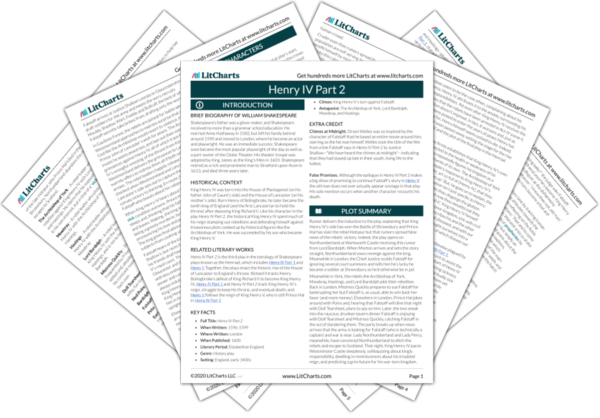As in Henry IV Part 1, traditional omens and prophetic signs function as controversial symbols in the play. While some characters trust in their power to foretell the future, other characters are more skeptical and seem convinced that any talk of prophetic omens is nothing but silly superstition. While Clarence and Gloucester express serious concern about the bad omens infesting the kingdom, Prince Hal never mentions them and seems confident that the only forces determining a kingdom’s future are the wits and actions of that kingdom’s leader. Likewise, while King Henry IV places huge stock in the power of decades-old prophecies to shape the future, Warwick laughs off his fears and promises the king that prophecies are nothing but a harmless guessing game.
Get the entire Henry IV Part 2 LitChart as a printable PDF.

Omens Symbol Timeline in Henry IV Part 2
The timeline below shows where the symbol Omens appears in Henry IV Part 2. The colored dots and icons indicate which themes are associated with that appearance.
Act 3, Scene 1
...king thinks how recently Richard, Northumberland, Percy, and himself were all friends. He remembers a prophecy Richard once gave that Bolingbroke (Henry IV) would rise to the throne via Northumberland and...
(full context)
...the future with a degree of accuracy. Richard thus simply made an accurate guess—not a prophecy.
(full context)
Act 4, Scene 3
As King Henry IV lies unconscious, Clarence and Gloucester discuss the grim omens that have plagued the kingdom recently: babies conceived without fathers or born horribly deformed; erratic...
(full context)
...fainted was and, hearing it’s named “Jerusalem,” marvels at the unexpected fulfillment of a long-ago prophecy that he “should not die but in Jerusalem, which vainly I supposed the Holy Land.”...
(full context)












